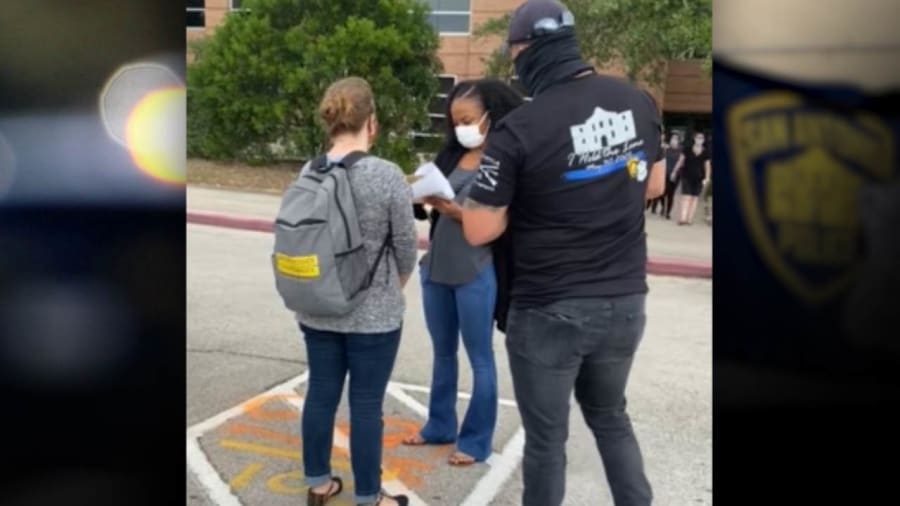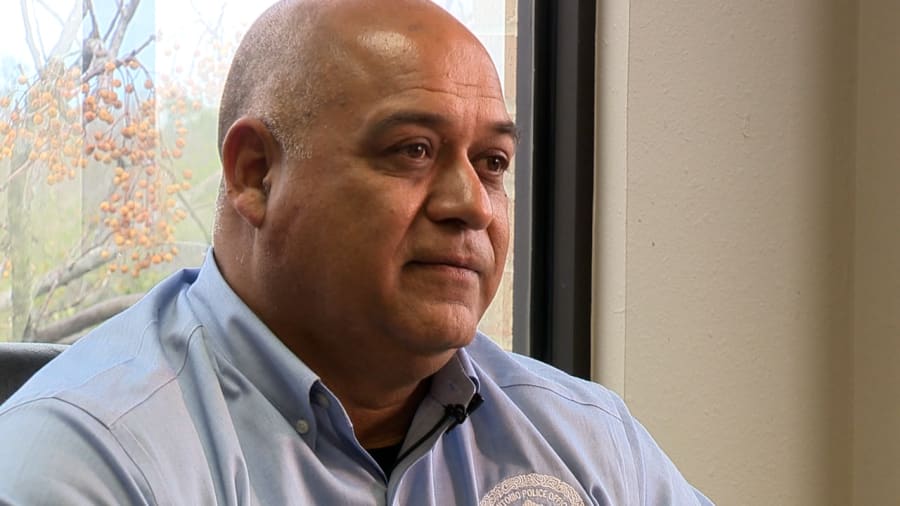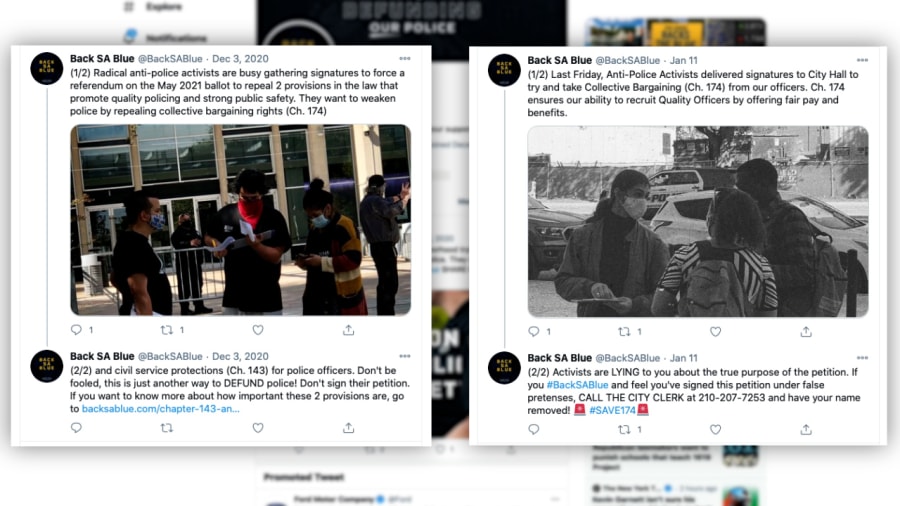SAN ANTONIO – On the eve of starting negotiations between city and police union officials on the next collective bargaining act for the San Antonio Police Department, members of the group spearheading efforts to reform officer discipline have described the threats and harassment they endured in recent months, at times from police officers, while trying to collect enough signatures get the repeal effort on the May ballot.
The head of the San Antonio Police Officers Association has pushed back on those characterizations in recent weeks, claiming during an interview with the KSAT 12 Defenders that officers were simply correcting information about the department’s discipline process that petitioners were misinterpreting.
Fix SAPD, a local activist group formed last year, successfully gathered the 20,000 signatures needed to allow San Antonio voters to decide whether to repeal Chapter 174, the state law that provides collective bargaining rights for its rank and file police officers.
The law, adopted by San Antonio voters in 1974, allows the San Antonio Police Officers Association to negotiate with the city on matters like compensation, health care and officer discipline.
Officer discipline moved to the forefront of future talks between the city and union following a number of developments in 2020.
An hour-long special from the Defenders, which aired in January 2020, revealed that fired SAPD officers who later appealed were reinstated to their jobs 67.5% of the time from 2010-2019, either by a third-party arbitrator or after the chief reconsidered their termination.
The May killing of George Floyd by Minneapolis police sparked international protests, including weeks of demonstrations in San Antonio.
Leaders of Fix SAPD, which was created to help remove what group members described as “disciplinary barriers” within SAPD, said in recent interviews that members of the department harassed them at polling sites while they gathered signatures last fall.
Video provided to the Defenders shows one incident recorded on a cell phone camera in October outside an early polling site.

In the two minute and 20 second clip, a large man with a face covering attempts to shut down an unpaid female volunteer while she tries to gather a signature from another woman and then takes part in a heated argument with a second petitioner, a man recording him on his cell phone camera.
The man with the face covering identifies himself as a 12-year veteran of SAPD, but declined to provide his name, according to members of Fix SAPD.
“Grown men towering over smaller women and younger women, petitioners. Just yelling, yelling in their faces,” said Fix SAPD Deputy Director Ananda Tomas, who added that it was far from an isolated incident.
During the footage, the unidentified man tells the male petitioner who is recording him, “You reap what you sow. You’re going to have to end up living here in neighborhoods like Baltimore. Everybody’s going to leave. But that’s what you want.”
“What if I start telling you how to do your job as a teacher? You’ve never been a policeman. You don’t know what it’s like,” says the unidentified man as he becomes more agitated.
Tomas said the volunteers declined to file a police report because they were afraid it would list their names on it and are fearful of retaliation.
Tomas described another incident on Election Day in which security at Maverick Park had to escort a female petitioner to her car because she was fearful of off-duty officers who had shown up at the same polling site.
Tomas added that canvassers who attempted to gather signatures door-to-door will not return to some neighborhoods after being followed.
In late October, the group was forced to create a step-by-step policy of how to respond to harassers, according to documents reviewed by the Defenders.
“At no point should anybody’s life be threatened for doing something that they believe in,” said Tomas.
Le Reta Gatlin-McDavid, a member of the Texas Organizing Project who helped run the Fix SAPD petition campaign, said the last several months have been “extremely different” than any campaign she has ever been part of.
“A signature should not cause me to be heckled in the grocery store, for me to be stopped, like for me to worry about someone snatching my backpack because they’re saying I’m trying to take their dad’s job because he’s a police officer,” said Gatlin-McDavid.
“Unfortunately, one thing that we have learned is that people don’t like that we’re asking for accountability of our police department,” said Josey Garcia, a member of the Reliable Revolutionaries civil rights activism group.
Garcia said she witnessed multiple harassment incidents while serving as a project lead for Fix SAPD’s paid petitioner program.
“They think we’re trying to get rid of the police department, when all we’re asking is for them to be accountable for these bad characters who violate the law,” said Garcia.
Signature gatherers have also been threatened by homeowners, SAPD records show.
SAPD received a call from the group in mid-December, after a person at a home grabbed a shovel and told the petitioner to get off his property, records show.
“No different than a bake group or book club”
Fix SAPD co-founder Oji Martin did not mince words when describing the local police union during an interview earlier this year.

When asked by the Defenders whether she has feared for the physical well-being of her and her family, Martin said, “Yes I have. It impacts us in a great way when we have a bully that just will not let San Antonio be, will not let San Antonio speak.”
“(SAPOA is) a club. It’s a non-governmental entity. They have no bearance on the city. The city does not decide who makes up the club, so it’s no different than a bake group or book club. It’s really no different,” said Martin.
SAPOA president Danny Diaz, who has officially been on the job less than two weeks, said members of his association go through far too much to be described as a book club.
“Is it a family? Yes. It’s not a book club. If you’re in a book club, your life isn’t in danger on a daily basis. Ours is,” said Diaz.
Diaz called Fix SAPD’s repeal efforts a form of defunding and added that stripping away Chapter 174 will hurt diversity within SAPD’s rank and file and make the department a less attractive place to work.
“If you take away the rights that the officers have and the collective bargaining agreement, you’re taking away benefits. We’ve got 40 years of history that has been in place that has worked for a very long time,” said Diaz.
He declined to say how much the association would spend in the coming months trying to defeat the Chapter 174 repeal effort, but said a claim from Fix SAPD members that it would be at least $1 million was inaccurate.
Diaz also defended the actions of off-duty officers who engaged petitioners as they attempted to gather signatures during early voting last fall.
“We didn’t send anybody out just to instigate, to start any fights, to do any of the sort. It’s just to educate. We’re out there for a reason and that’s to educate the community. They’re misrepresenting and they don’t know what they’re signing,” said Diaz.

Pressed by the Defenders about what Fix SAPD misrepresented or misinterpreted during the petition drive, Diaz said the group inaccurately described the department’s 48-hour rule.
The rule requires an officer accused of wrongdoing to receive at least 48 hours notice before he or she must appear before internal affairs.
That notice provides time for the officer to arrange for child care, if needed, and to make sure a union representative or attorney is available to appear alongside him or her while being questioned by internal affairs investigators.
“We’re defending the process, right? And really what we’re talking about is we’re talking about due process. Every citizen in the United States has a right to due process. Policemen are no different,” said Diaz.
Diaz said members of Fix SAPD have inaccurately told voters that officers are allowed to view all evidence against them during that 48 hours.
“If you take due process away from the officers, you’re going to be hard pressed to hire anyone,” said Diaz.
City officials in recent weeks said they would like to shorten the 48-hour window prior to an internal affairs interview taking place, but have not yet said publicly how much advance notice an officer should get.
Fix SAPD members said comments made by Diaz during a press conference outside public safety headquarters in early January only inflamed criticism of the group after Diaz described members as radical anti-police activists.
During the press event, Diaz also referred to members of the group as “out of state political operatives funded by dark, special interest groups.”
Diaz defended his comments during an interview weeks after the press conference and said he was referring to significant donations accepted by Fix SAPD that could not be traced.
“Look, let’s face it. There’s money coming into this town that is supporting candidates, political or whatever, you might say, but it’s coming from New York, California. That’s the reasoning behind that comment,” said Diaz.
Martin laughed at that description of Fix SAPD’s finances and asked out loud, “What is dark money? Can someone please tell me?”
She added that Fix SAPD’s petition drive was a grassroots effort that later benefited from a large donation from the Texas Organizing Project.
Fix SAPD has also taken issue with the “Back SA Blue” social media accounts posting pictures of petitioners, claiming that decision has caused those people to be harassed online.

Diaz confirmed the accounts are run by an advertising agency that also does work for SAPOA, and said he sees nothing wrong with actual Fix SAPD members being shown in the posts.
A review of Back SA Blue’s social media accounts shows that though stock photos were used in some posts when encouraging residents not to sign the petition, photos of actual petitioners were used time and time again.
What happens if Chapter 174 is repealed?
Negotiators from the city and union are scheduled to have their first collective bargaining agreement (CBA) session Friday at 10 a.m. at the Henry B. Gonzalez Convention Center.
While the current CBA expires at the end of September, an 8-year evergreen clause will keep the agreement going if that expiration date passes.
The two sides enter negotiations with the vote on the future of Chapter 174 now less than three months away.
If the May repeal vote fails, the current CBA process continues.
If the measure passes, repealing Chapter 174, the current CBA continues through the end of September and through any primary term of a successor agreement, according to a presentation given by city negotiators to council members earlier this year.
If no successor agreement is negotiated prior to the repeal, many SAPD policies and procedures revert back to Chapter 143, according to the same presentation.
That chapter of the local government code sets baseline rules for the operation of police and fire departments in Texas.
Operating under 143 would cause many of SAPD’s current policies, procedures and benefits to be stripped away.
For example, the current CBA dictates levels for base pay, step pay, longevity pay and other specialty pays, while a department operating only under 143 has no preset wage increase other than longevity or seniority pay and requires the same base pay within each rank.
Reverting back to 143 would also eliminate SAPD’s current equipment and vehicle provisions and would decrease the number of positions appointed by the chief, according to city records.
Fix SAPD members are also in the process of trying to gather enough signatures to get a measure allowing San Antonio voters to opt-out of Chapter 143.
That threshold, however, is much higher and would require the group to gather around 80,000 signatures.
Fix SAPD members in recent weeks said they were hopeful to reach that number and get that measure before voters on a ballot in the near future.
Martin said any repeal measures pushed by Fix SAPD would only apply to SAPD, and not to other first responders in San Antonio.


